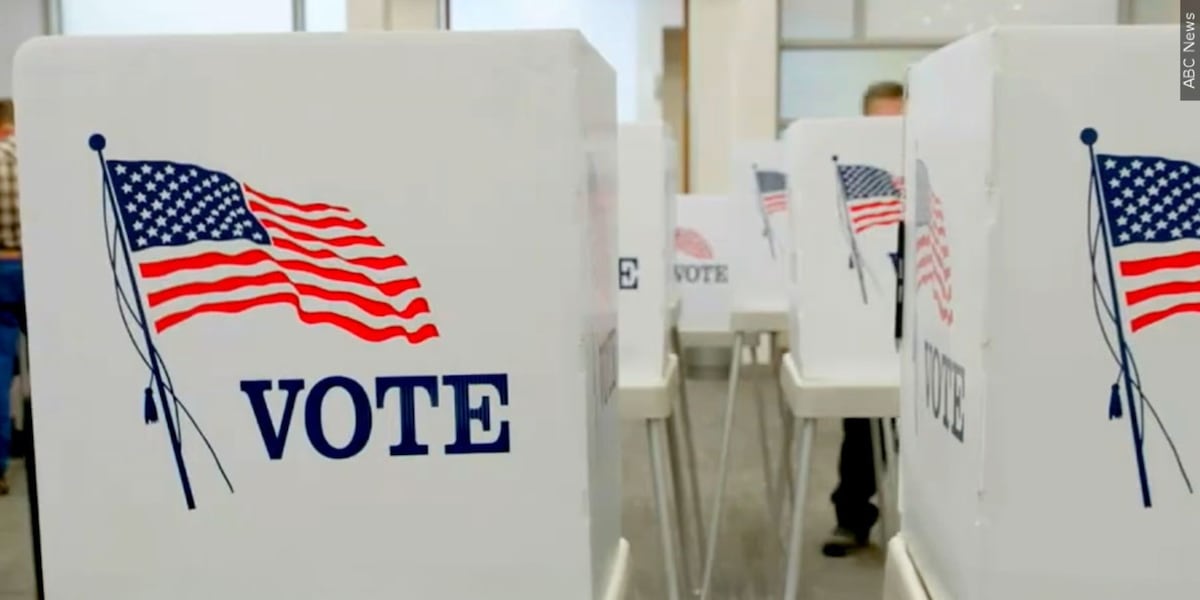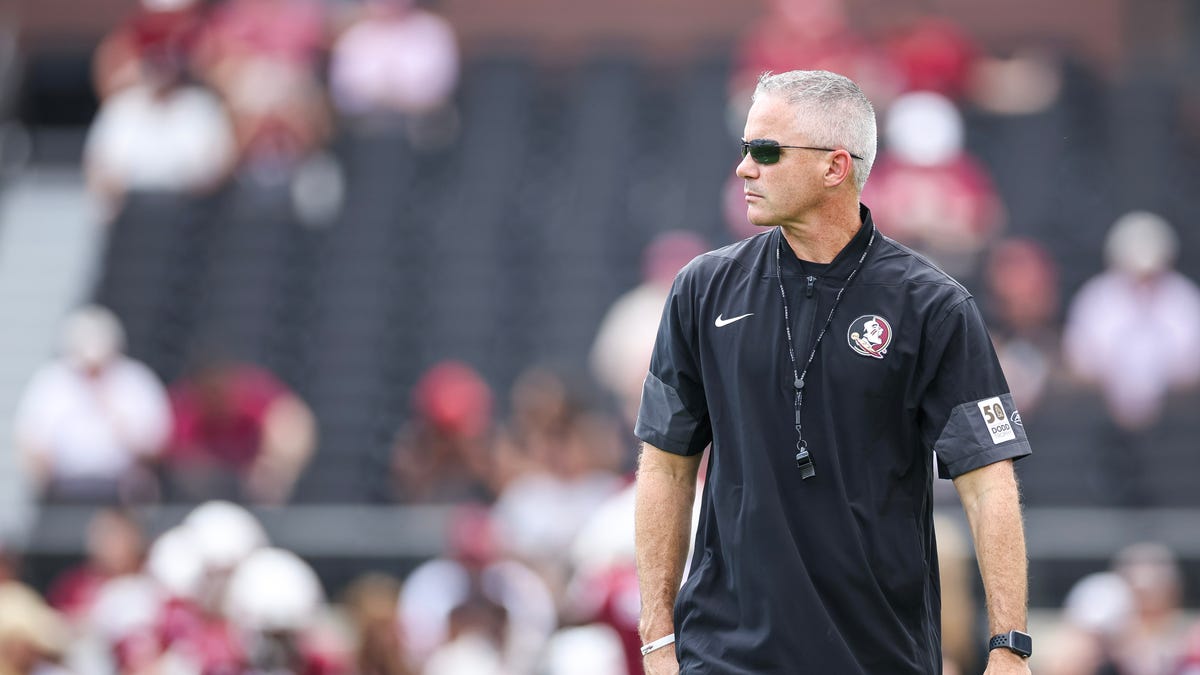World
Dominican president threatens to close border with Haiti over canal dispute

The Dominican government has alleged that a Haitian-built canal threatens to divert its water and harm its farmlands.
The president of the Dominican Republic has announced a freeze on new visas for Haitians and threatened to close the border between the two countries as tensions rise over a disputed canal.
President Luis Abinader issued the order on Monday, citing construction work on a Haitian canal that Dominican officials say will divert water from the Massacre River, which runs in both countries.
“If the conflict is not resolved before Thursday, [officials will] completely close the border to air, sea and land commerce,” the government said in a statement.
The announcement is the latest chapter in a long history of friction between the two countries, which share the same island of Hispaniola but are split by ethnic, linguistic and cultural divisions.
In an unusual complication, it remains unclear who authorised work on the canal in Haiti.
The Dominican government said it believes Haitian citizens are acting unilaterally to build the waterway, without the approval of their local officials.
In Monday’s statement, the Dominican government framed the situation as an indication of the instability on the other side of the border.
“The Haitian government has repeatedly admitted it does not have the capacity to resolve internal conflicts due to the loss of the Haitian state’s monopoly on force due to criminal organizations,” it said.
Haiti has indeed seen an uptick in gang violence in recent years, particularly in the wake of the assassination of President Jovenel Moïse in 2021. No federal elections have been held in recent years, contributing to a power vacuum that criminal organisations had taken advantage of.
The United Nations estimated last December that at least 60 percent of the Haitian capital Port-au-Prince had fallen under gang control.
The resulting violence has forced tens of thousands of Haitians to flee their homes, with some seeking safety across the border in the Dominican Republic, another source of tension between the two countries.
Abinader has stepped up efforts to restrict immigration, including through the construction of a border barrier between the two countries. He has also ramped up deportation efforts.
William Charpantier, coordinator for MENAMIRD, a national roundtable for migrants and refugees in the Dominican Republic, told Al Jazeera that 20,000 people were expelled in a nine-day period last year.
Some, he said, were not even Haitian but were rather Dominican citizens targeted because of their skin colour. Haiti is a predominantly Black country, while the majority of Dominicans identify as mixed race.
“These deportations have resulted in the separation of families. People with valid documents have been deported, people who were born here in the Dominican Republic have been deported,” Charpantier said. “These aren’t deportations. It’s persecution based on race.”
Experts warn that, if the Dominican Republic follows through on Monday’s threat to fully seal the border, it could have a devastating impact on the already impoverished Haiti, which relies heavily on imports from its neighbour.
The move could even harm the Dominican economy. Haiti serves as the country’s third-largest trading partner and informal trade across the border likewise results in millions of dollars in profit.
A study from the Dominican Republic’s Central Bank estimated that, in 2017, the informal trade amounted to approximately $430m in commerce. Of that figure, $330m was in exports to Haiti.
Last week, Abinader ordered a vital crossing near the town of Dajabon closed after reports of excavation work on the canal, which Dominican officials worry could harm farmland and the environment.
The government has said that it will seek talks with Haiti to find a “definitive solution”.

World
YouTube to start bringing back creators banned for COVID-19 and election misinformation
NEW YORK (AP) — YouTube will offer creators a way to rejoin the streaming platform if they were banned for violating COVID-19 and election misinformation policies that are no longer in effect, its parent company Alphabet said Tuesday.
In a letter submitted in response to subpoenas from the House Judiciary Committee, attorneys for Alphabet said the decision to bring back banned accounts reflected the company’s commitment to free speech. It said the company values conservative voices on its platform and recognizes their reach and important role in civic discourse.
“No matter the political atmosphere, YouTube will continue to enable free expression on its platform, particularly as it relates to issues subject to political debate,” the letter read.
The move is the latest in a cascade of content moderation rollbacks from tech companies, who cracked down on false information during the pandemic and after the 2020 election but have since faced pressure from President Donald Trump and other conservatives who argue they unlawfully stifled right-wing voices in the process.
It comes as tech CEOs, including Alphabet CEO Sundar Pichai, have sought a closer relationship with the Republican president, including through high-dollar donations to his campaign and attending events in Washington.
YouTube in 2023 phased out its policy to remove content that falsely claims the 2020 election, or other past U.S. presidential elections, were marred by “widespread fraud, errors or glitches.”
The platform in 2024 also retired its standalone COVID-19 content restrictions, allowing various treatments for the disease to be discussed. COVID-19 misinformation now falls under YouTube’s broader medical misinformation policy.
Among the creators who have been banned from YouTube under the now-expired policies are prominent conservative influencers, including Dan Bongino, who now serves as deputy director of the FBI. For people who make money on social media, access to monetization on YouTube can be significant, earning them large sums through ad revenue.
House Judiciary Committee Chairman Jim Jordan and other congressional Republicans have pressured tech companies to reverse content moderation policies created under former President Joe Biden and accused Biden’s administration of unfairly wielding its power over the companies to chill lawful online speech.
In Tuesday’s letter, Alphabet’s lawyers said senior Biden administration officials “conducted repeated and sustained outreach” to coerce the company to remove pandemic-related YouTube videos that did not violate company policies.
“It is unacceptable and wrong when any government, including the Biden Administration, attempts to dictate how the Company moderates content, and the Company has consistently fought against those efforts on First Amendment grounds,” the letter said.
Meta CEO Mark Zuckerberg has also accused the Biden administration of pressuring employees to inappropriately censor content during the COVID-19 pandemic. Elon Musk, the owner of the social platform X, has accused the FBI of illegally coercing Twitter before his tenure to suppress a story about Hunter Biden.
The Supreme Court last year sided with former President Joe Biden’s administration in a dispute with Republican-led states over how far the federal government can go to combat controversial social media posts on topics including COVID-19 and election security.
Asked for more information about the reinstatement process, a spokesperson for YouTube did not immediately respond to a request for comment.
World
Syria’s new president takes center stage at UNGA as concerns linger over terrorist past

NEWYou can now listen to Fox News articles!
Once a member of al Qaeda and the Islamic State and now leading Syria’s fragile transition since toppling the Bashar Assad regime, Ahmed al-Sharaa is ready to take to the global center stage at the United Nations General Assembly Wednesday and make his case for a new path forward for his war-torn nation.
“This marks the first participation in high-level meetings of a Syrian president at the United Nations General Assembly since 1967, so this is a very big deal,” Natasha Hall, senior associate at the Center for Strategic and International Studies, told Fox News Digital.
“On such a historic occasion, what he will try to emphasize and underline is that this is a new day for Syria. They have overthrown the brutal dictatorship of the Assad regime. He will talk about the progress that’s been made and what more progress needs to happen in terms of recognition and the lifting of U.N. sanctions to help Syria move forward,” Hall added.
TRUMP’S MIDDLE EAST TOUR BEGINS WITH SYRIA LOOMING AS STRATEGIC OPPORTUNITY
Interim Syria President Ahmed al-Sharaa speaks during the Concordia Annual Summit in New York, Monday, Sept. 22, 2025. (Photo/Andres Kudacki)
A high-ranking Syrian government official confirmed to Fox News Digital that al-Sharaa will use the opportunity at the U.N. to present Syria’s vision for stability, reconstruction, and reconciliation.
“The most important issues he will raise include the need to lift all forms of unilateral sanctions that continue to hinder Syria’s recovery, the importance of combating terrorism in all its forms, the return of displaced Syrians and refugees, and the advancement of a genuinely inclusive political process rooted in the will of the Syrian people,” the Syrian official said.
Al-Sharaa, who led the Islamist rebel group Hay’at Tahrir al-Sham (HTS) to victory over Assad, ditched his military fatigues for a Western-style suit and has been on a charm offensive, hosting European and Western diplomats and politicians in hopes of bringing Syria out from its international pariah status.
The new Syrian leader received an unprecedented endorsement from President Donald Trump when the two met in Riyadh, Saudi Arabia, in May.
Trump called al-Sharaa a “young, attractive, tough guy,” announcing that the U.S. would lift sanctions in place since the Assad era and even discussed normalizing relations.
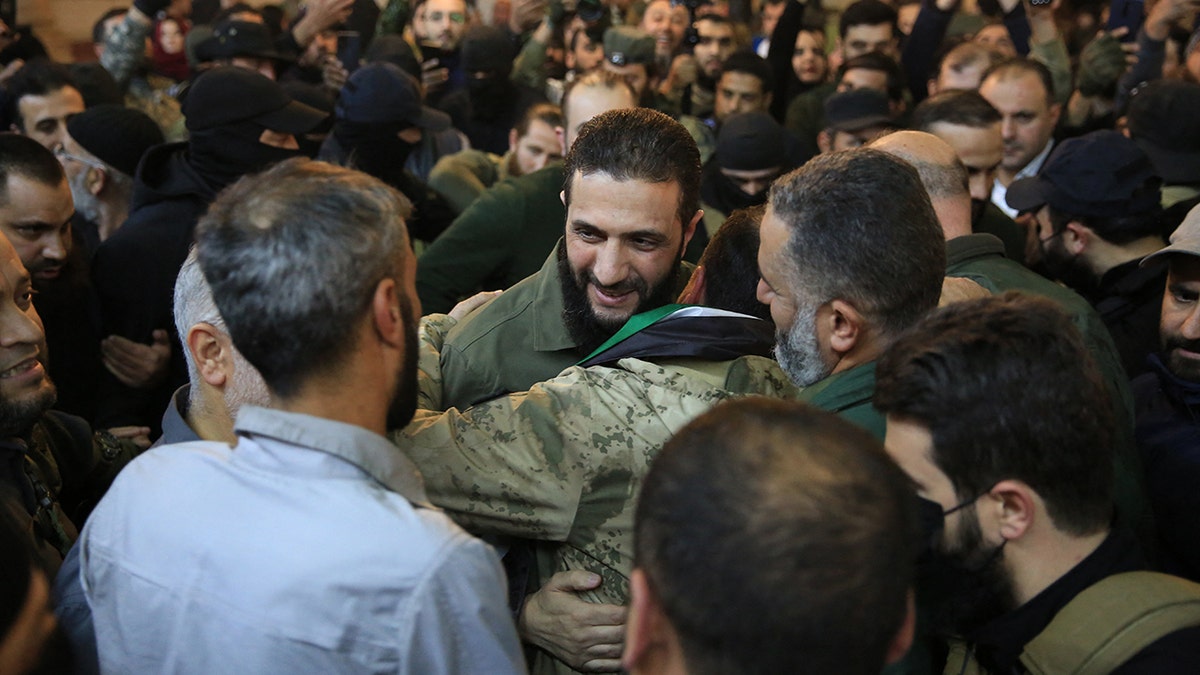
People welcome the leader of Syria’s Islamist Hayat Tahrir al-Sham (HTS) group that headed a lightning rebel offensive snatching Damascus from government control, Ahmed al-Sharaa (C), before his address at the capital’s landmark Umayyad Mosque on December 8, 2024. Al-Sharaa gave a speech as the crowd chanted “Allahu akbar (God is greatest),” in a video shared by the rebels on their Telegram channel showed. (Aref Tammawi/AFP via Getty Images)
Hall noted that al-Sharaa might be looking to secure a security pact between Israel and Syria along the UNGA sidelines, emphasizing that he seeks a Syria that is at peace with its neighbors and doesn’t want to position Syria to be a threat to any outside forces, particularly Israel.
He will also be looking to secure much-needed reconstruction aid to rebuild a country ravaged by 13 years of civil war. The cost for reconstruction is estimated to be between $250 and $400 billion, and 16.7 million people, or 75% of the population, are in dire need of humanitarian assistance, according to the U.N.
Since seizing Damascus, he has publicly said all the right things. He promised an inclusive government that would represent all religious and ethnic factions in Syria, uphold women’s rights and protect minority rights.
ISLAMIST GROUP RUNNING SYRIA HAS MIXED RECORD OVER GOVERNANCE IN PROVINCE, RULED WITH ‘IRON FIST’
Al-Sharaa also fulfilled promises to target ISIS and other terrorist groups operating in Syria. One month after taking power, Syrian security forces seized a shipment of heavy ammunition destined for Hezbollah in Lebanon, once a key ally of the Assad regime and Iran’s Axis of Resistance.
While optimism for a new Syria remains high, some caution it’s still too soon to judge al-Sharaa as a Western ally given his terrorist past.
“Al-Sharaa is not a democrat. He ruled Idlib without power-sharing. So far, in terms of control of vital government functions like security, foreign affairs, intelligence and justice, he has put loyalists in place,” former U.S. Ambassador to Syria Robert Ford told Fox News Digital.
Ford, who was the last U.S. ambassador in Damascus in 2011, said the crucial question is whether, over time, individual political and civil liberties will be respected and that people maintain, as they have now, the freedom to organize and protest.
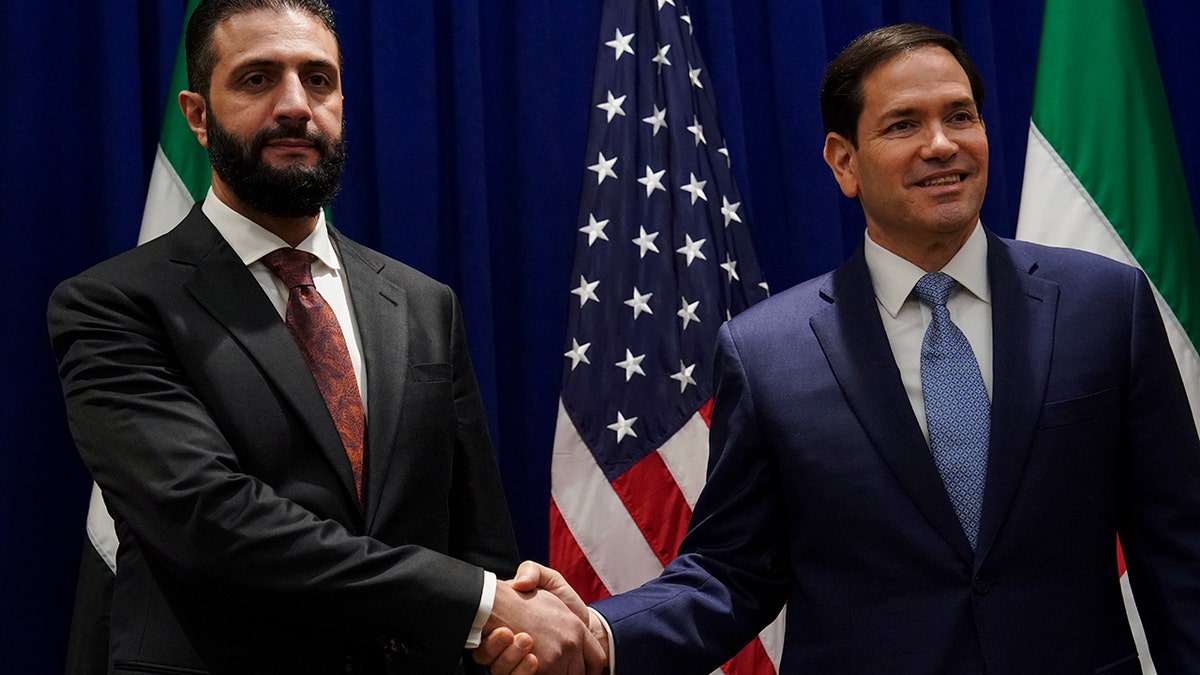
Secretary of State Marco Rubio shakes hands with Syrian interim President Ahmad al-Sharaa at the Lotte New York Palace Hotel, on the sidelines of the 80th United Nations General Assembly at the United Nations headquarters, Monday, Sept. 22, 2025. (Bing Guan/Pool Photo via AP)
“Al-Sharaa’s heavy hand ruling Idlib prior to Assad’s fall has been lighter in Damascus, Aleppo and elsewhere. But so far, there is more political freedom to speak and protest in Syria than in many other countries in the region, such as Egypt, Algeria and some Gulf states,” Ford added.
Ambassador Barbara Leaf, who served as assistant secretary of State for Near Eastern Affairs, visited Damascus and met with Shara in December, becoming the highest-ranking official to meet with Syrian leadership since the outbreak of the Syrian civil war in 2011.
Leaf, a distinguished diplomatic fellow with the Middle East Institute, told Fox News Digital about her initial contact with Shara right after HTS overthrew Assad. Her mission was to get eyes on him, to assess him and to send a clear signal on U.S. expectations if he was going to lead a new Syria.
“My takeaway from the meeting was that he came across as somebody who was very well-prepared for the discussion. He had clearly anticipated all of the topics that I raised and he had pretty thoughtful responses with a readiness to engage,” she said.
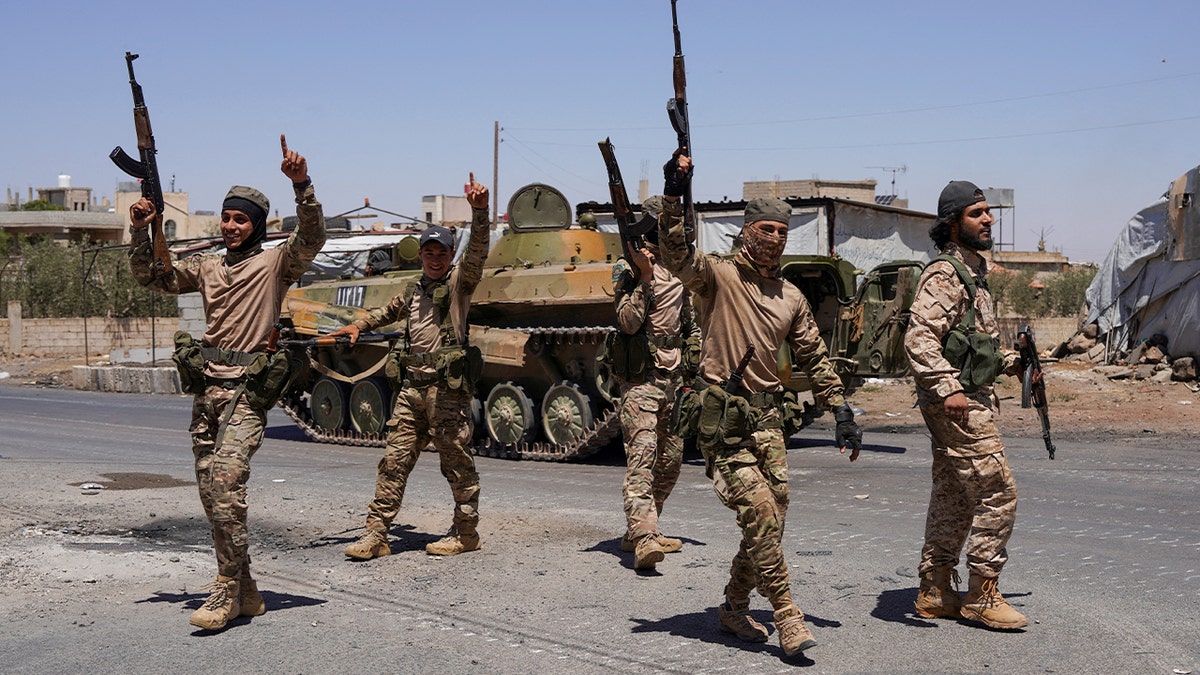
Syrian security forces walk together along a street, after clashes between Syrian government troops and local Druze fighters resumed in the southern Druze city of Sweida early on Wednesday, collapsing a ceasefire announced just hours earlier that aimed to put an end to days of deadly sectarian bloodshed, in Sweida, Syria, July 16, 2025. (Karam al-Masri/Reuters)
Al-Sharaa made a point several times to say that Syria would no longer be a threat or a staging point for threats against its neighbors, including Israel, and that he would not allow the Iranians, Hezbollah or Palestinian groups, to use Syrian territory to conduct terrorist activities, the ambassador said.
“I came to the sense that he was already making a shift from being a military commander to being a politician, to being a political leader,” Ambassador Leaf noted.
While Ambassador Leaf highlighted his pragmatism, his true intentions as the new leader of Syria remain murky.
The ambassador said that it appears al-Sharaa has traveled a trajectory away from his jihadist terrorist past, but it remains a question how far he is willing to go to effectuate what she believes is an intention to form an Islamist style of governance.
CHRISTIAN WATCH GROUP RISES UP TO PROTECT COMMUNITY AMID GROWING VIOLENCE IN SYRIA
“Does he want to formulate a kind of Islamist governance, conservative governance and social order that, frankly, Syria has not seen? And would he be willing to use force to get there? That’s an unknown,” the ambassador cautioned.
What’s concerning for Ambassador Leaf and others is that many of the people serving in key roles in the transitional government are close associates of al-Sharaa and others affiliated with HTS and other allied armed rebel groups.
“Al-Sharaa is still engaged in a careful balancing act within his own government between liberal opposition voices, former regime bureaucrats and more Islamist proponents aligned still with HTS’ mission and principles,” Caroline Rose, director of The New Lines Institute, told Fox News Digital.
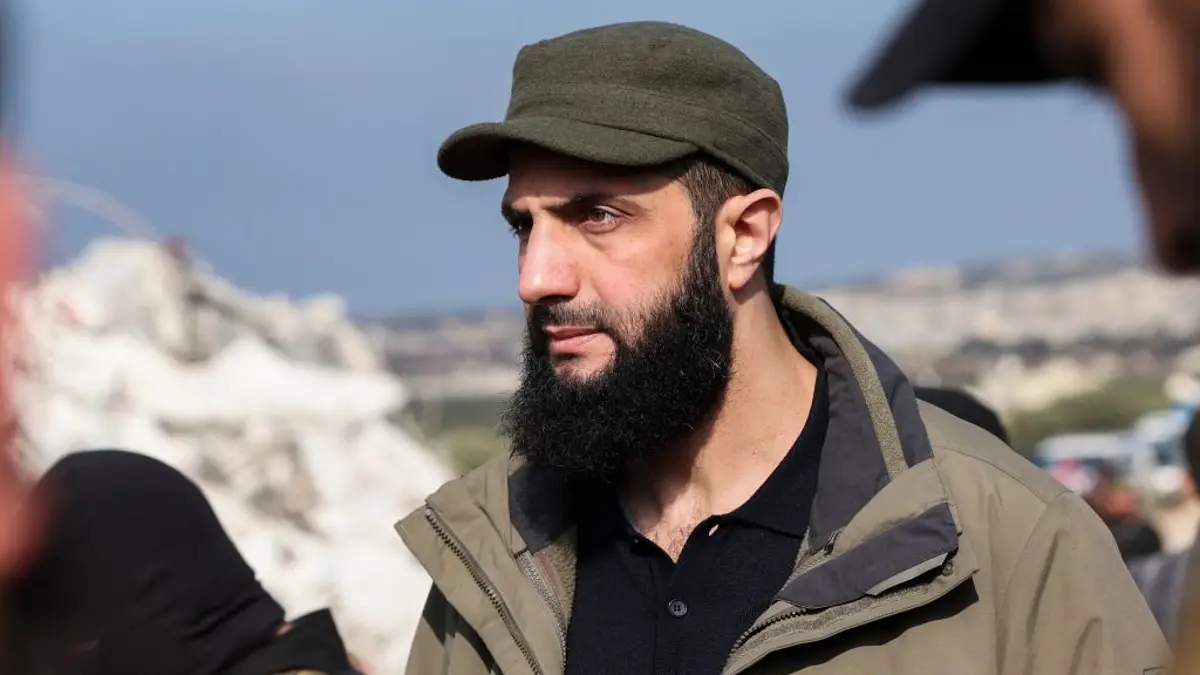
Ahmed al-Sharaa, once known by his nom de guerre Abu Mohammed al-Jolani, is seen in Syria Feb. 7, 2023. Since becoming the country’s president, he has gone back to his given name. (Omar Haj Kadour/AFP via Getty Images)
EVANGELICAL LEADER SAYS US MUST PROTECT SYRIAN CHRISTIANS FROM ATTACKS BY JIHADI TERRORISTS
Rose, who traveled to Syria earlier this year, said that Syria’s complex political dynamics have led not only to gridlock, but even incapacity in times of crisis, “such as failure to rein in radical Sunni fighters during violent outbreaks in Latakia and Suwayda, but also policies appeasing more conservative elements of al-Sharaa’s support network, such as the ruling requiring full-body swimwear at Syrian pools and beaches.”
While Syria’s new government has looked to consolidate control over a restive society, Shara’s forces had to manage a fragile society divided along ethnic and religious lines.
Syria has experienced a wave of sectarian violence since the revolution to overthrow Assad. Government security forces retaliated after forces loyal to the Assad regime launched an attack in the coastal city of Latakia, Assad’s hometown. In total, around 1,400 people, mostly civilians, were massacred, according to the U.N. Most of the victims from the Alawites, a minority group in Syria, which the Assad family belonged to, as well as from the Druze community.
It was the worst episode of violence since the overthrow of Assad in December 2024.
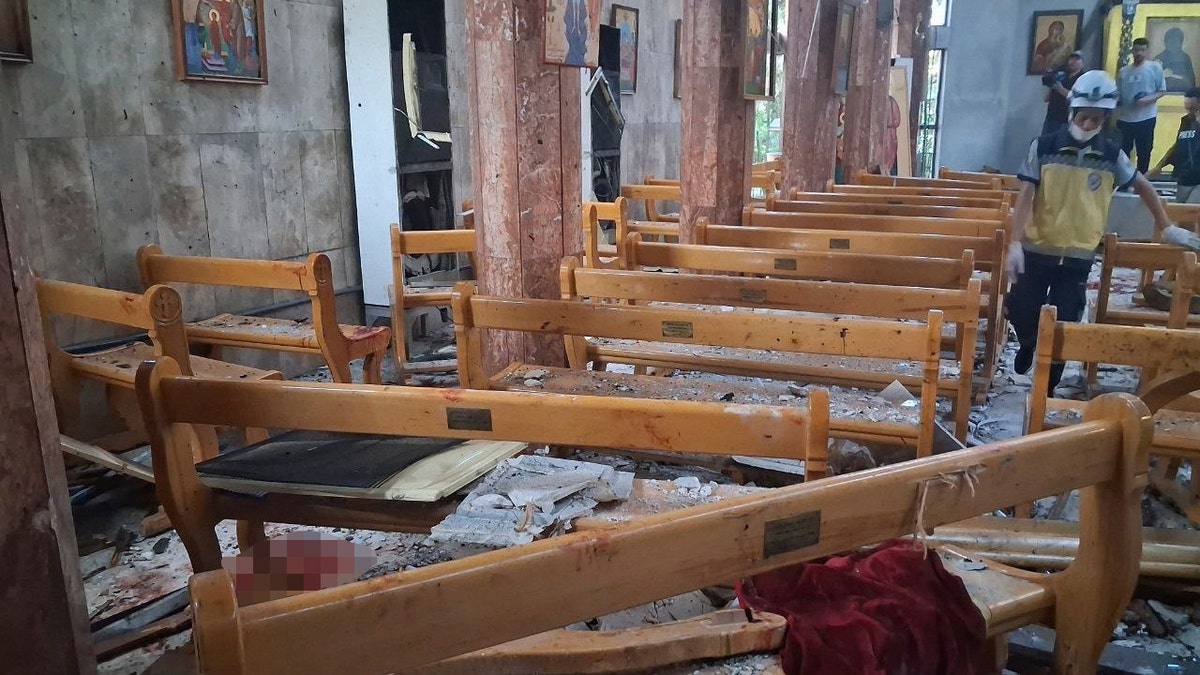
In this photo released by the Syrian official news agency SANA, a Civil Defense worker inspects the damage inside Mar Elias church where a suicide bomber detonated himself in Dweil’a on the outskirts of Damascus, Syria, Sunday, June 22, 2025. (SANA via AP)
Clashes between Bedouin tribes, Druze militias and government forces in Suweida led to hundreds of deaths and drew in Israeli military intervention — to protect Syria’s Druze minority. A ceasefire was eventually agreed to but the spiraling ethnic violence highlights Syria’s rocky transition.
The country’s dwindling Christian community has also felt the brunt of extremist violence. In June, the Islamic State was suspected of carrying out a deadly suicide bombing at a Greek Orthodox church in Syria, which killed 22 worshipers and injured 63 others. Christians have also been attacked and, in some cases, killed, allegedly by forces tied to the al-Sharaa government.
The new authorities will also have to incorporate Kurdish forces operating in Northeast Syria, where the Syrian Democratic Forces have been crucial to the U.S.-led counter-ISIS campaign. Any disruptions in the merging of the SDF into the Syrian state raises the risk of an ISIS resurgence.
World
Palestine as a state – what would that actually look like?
For a Palestinian state to be internationally recognised and built, Israel’s current government would need to halt its relentless opposition to Palestinian statehood and Israel’s main ally, the United States, would need to agree on a two-state solution, which it no longer does.
-

 Health1 week ago
Health1 week agoWho Makes Vaccine Policy Decisions in RFK Jr.’s Health Department?
-

 Finance4 days ago
Finance4 days agoReimagining Finance: Derek Kudsee on Coda’s AI-Powered Future
-

 Lifestyle1 week ago
Lifestyle1 week agoBobbi Brown doesn’t listen to men in suits about makeup : Wild Card with Rachel Martin
-

 Business1 week ago
Business1 week agoHow Nexstar’s Proposed TV Merger Is Tied to Jimmy Kimmel’s Suspension
-
North Dakota4 days ago
Board approves Brent Sanford as new ‘commissioner’ of North Dakota University System
-

 Technology3 days ago
Technology3 days agoThese earbuds include a tiny wired microphone you can hold
-

 Crypto3 days ago
Crypto3 days agoTexas brothers charged in cryptocurrency kidnapping, robbery in MN
-
World1 week ago
Russian jets enter Estonia's airspace in latest test for NATO

